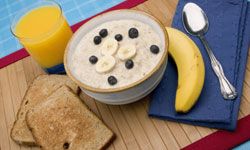We've heard it a million times: Breakfast is the most important meal of the day. That's not just your mom trying to get you to eat your scrambled eggs. Breakfast really is important. Because breakfast jump-starts your metabolism, people who eat breakfast tend to have a healthier body weight. But did you know that breakfast also jump-starts your brain?
Of course, we're talking about a proper breakfast -- not a bowl full of sugary cereal (aka empty calories). If you eat the right kind of breakfast, you'll be more alert, energetic and mentally sharp during the day. The keys to a healthy breakfast are protein and whole grains. Let's take a look at the best meals to kick off your day.
Advertisement
